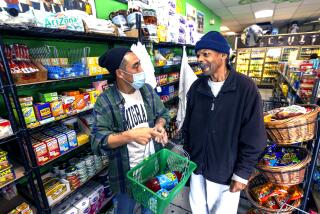It’s No Longer Business as Usual at Nation’s Military Supply Stores
- Share via
SEATTLE — It isn’t something he likes to highlight, but it’s a fact that, during periods of war and unrest, business shoots up at Jack Schaloum’s store. This time the hot items are gas masks and ageless macaroni.
Schaloum and his older brother Henry own and operate the Federal Army & Navy Surplus Store in a hip part of the city’s core called Belltown. Three generations of Schaloums have run the business, which seems a misfit among the neighborhood’s trendy boutiques and eateries: A Patagonia store sits on one side, a Thai restaurant on the other and an artsy coffeehouse across the street.
The surplus store is a two-story brick box, as fashionable as a bunker. But with the war in Iraq and anxieties about possible chemical attacks by terrorists at home, the store, as it did during the Vietnam and Persian Gulf wars, has come to have its own allure.
Where else in the city can you buy official British army underwear or French military peacoats? Where else could you pick up an Israeli army gas mask or U.S. government-issue meals ready to eat, or MREs?
Many of the country’s estimated 2,500 military surplus stores report a similar surge of interest in survival supplies.
The Connection, in Rapid City, S.D., has had to extend its hours on some days to accommodate public demand for survival gear. A surplus store in Modesto, Crescent Work & Outdoor, has reported increased sales of gas masks and chemical suits. In New York City, the owners of Kaufman’s Army & Navy Surplus said demand for prepackaged meals is as high as ever.
Since Feb. 17, when the U.S. government increased the country’s terrorism alert status to code orange, Jack Schaloum said, his store has sold more than 1,000 gas masks and nearly 800 cases of MREs. Each case, costing $75, contains 12 hermetically sealed food packages of such dishes as macaroni and cheese or rice and beans.
“It’s not something we take advantage of,” said Schaloum (pronounced sha-LOOM), 47, a blue-jeans-and-Nikes kind of guy with thick glasses. He likens his looks to Tom Cruise’s to get a laugh. He sits in his drafty loft office with windows that look out over his store.
“It’s the nature of the world. If there’s a flood, the lumberyards might see business go up, because people are boarding up windows,” he said, swiveling side to side in his chair. “If there’s a blackout in the city, stores that sell batteries might sell more batteries.”
His business offers at least six kinds of gas masks, ranging in price from $12.99 to $199.99. The masks come from Canada, Russia, Israel, Germany and the United States. They all have a similar horse-snout, bug-eyed construction, most with straps that go around the head.
On Wednesday, Fu Chao, 52, a supermarket manager, came into the store during his lunch hour and went straight to the gas mask display. He asked questions about the Russian model, marked at $12.99. He tried one on and decided immediately.
“Four of these,” he said.
They were for his wife, his son in San Francisco, his daughter in Seattle and himself. They would carry the masks wherever they went. He said he got the idea from friends who had bought their own gas masks.
“Better to buy them now, before everybody wants them,” Chao said. He was in the Taiwanese army 30 years ago and had never thought about owning a gas mask until now. He said he was trying to protect his family from “you never know what.”
He came across as another ordinary American living an ordinary life -- an ocean and a continent away from the battle front -- shaken into a new kind of anxiety. Since Sept. 11, the anxiety, for some, has been assuaged by going through the motions of preparing for the worst, and Schaloum’s store in some ways caters to the urge.
It could have gone much differently for the family. It was simple fate, to hear Schaloum tell it, that the business would revolve around military supplies.
Jack and Henry’s parents were Holocaust survivors who met after World War II and came to Seattle in the early 1950s. They bought an empty store that had been operated by another family since 1917. The father, Izak, heard about a military surplus auction at nearby Ft. Lewis, attended it and came back with merchandise to sell.
“He didn’t know what a canteen was,” said Jack Schaloum, adding that if his father had gone to a furniture auction, “I’d be selling couches instead of gas masks.”
Today, one of Henry’s daughters, Davina, 26, runs the shop’s Internet business, just above Jack’s office. Federal Army & Navy Surplus went online in 1998, and maintains, among other things, that it has “one of the largest knife inventories” in cyberspace.
Sometimes Davina finds herself behind the register. She provides the only feminine presence in what otherwise is a testosterone-filled gallery of war toys.
“I’ve pretty much grown up in here,” said Davina, who attended college, studied art and traveled the world for a while. “I knew at some point my life would end up here. I love it.”
It’s a family operation all around, with Henry’s dog, a drooling 9-year-old boxer named Cody, roaming the aisles. Jack will take a moment between conversations to wipe Cody’s chin.
The dog ambles down narrow corridors brimming with army backpacks, camouflage nets and waterproof grenade boxes. It’s floor-to-ceiling military ware, wall-to-wall body armor and bullet casings. The door swings open all day long, ushering in cold blasts of air. Jack, with his Nikes squeaking from office to cash register, doesn’t mind a bit.
More to Read
Inside the business of entertainment
The Wide Shot brings you news, analysis and insights on everything from streaming wars to production — and what it all means for the future.
You may occasionally receive promotional content from the Los Angeles Times.










